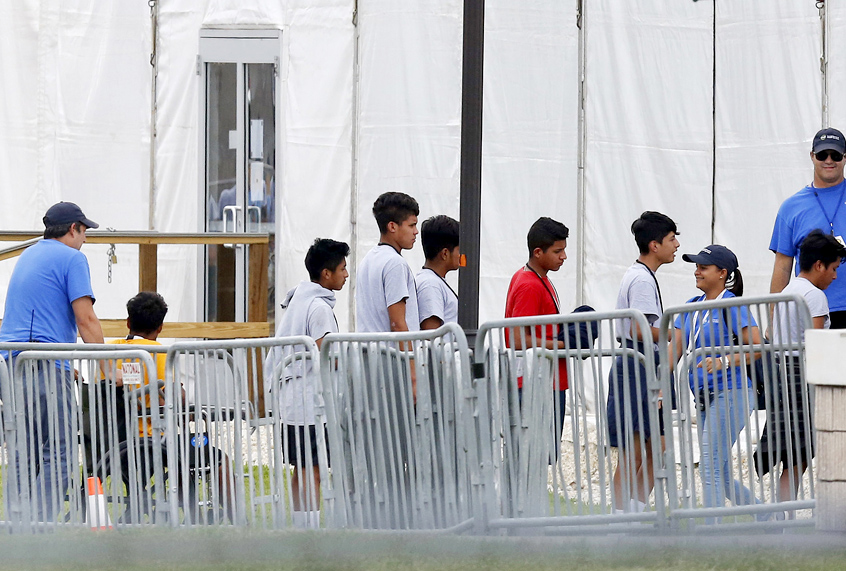A new, damning report released by the Department of Homeland Security’s internal watchdog on the Trump administration’s Zero Tolerance Policy on undocumented immigration has determined that leadership was unprepared for its implementation, lacked resources, struggled to reunite families separated at the border and held migrant children for extended stays in short-term detention facilities.
The DHS Office of Inspector General visited U.S. Customs and Border Protection and U.S. Immigration and Customs Enforcement facilities unannounced in the southern Texas area between June 26–28. The observations took place six days after President Trump signed an executive order to end his administration’s practice of separating migrant families at the border — an immigration crackdown that quickly became a humanitarian crisis. On June 26, a federal judge ordered the administration to reunite the more than 2,500 separated migrant children with their parents within 30 days, but as of late September, 136 children remain in federal custody, and three of those kids are under the age of five.
One of the most egregious findings in the report is that for the duration of the family separation policy, between May 5 and June 20, more than 860 migrant children were detained in Customs and Border Protection facilities for longer than the mandated 72-hour limit. The law caps the incarceration of minors because of the significant emotional, physical and traumatic effects it can have on a child. In one instance, a minor remained in custody for 12 days, and in another, a child was detained for 25.
“Many of those children were put in chain-link holding pens in the Rio Grande Valley of southern Texas. The facilities were designed as short-term way stations, lacking beds and showers, while the children awaited transfer to shelters run by the Department of Health and Human Services,” according to the Post.
The report also found that CBP, ICE and the Department of Health and Human Services lacked an integrated Federal immigration information system and its absence severely complicated the mission of identifying and reuniting separated families. “On June 23, 2018, DHS announced that DHS and HHS had ‘a central database’ containing location information for separated parents and minors that both departments could access and update. However, OIG found no evidence that such a database exists,” the report says.
Migrant parents also spoke of a lack of communication to them regarding the family separation policy at the border, and OIG found that five out of six individuals said they were provided no information before or at the time when they were separated from their children. “The sixth stated that when he left the Border Patrol facility to appear in court for prosecution, a Border Patrol Agent told him that his 5-year-old daughter would still be at the Border Patrol facility when he returned,” according to the report. “When he arrived at court, however, he was given a short flyer that explained for the first time that he would be separated from his child. After his court hearing, he was driven back to the same Border Patrol facility, but not taken inside. Instead, he was placed on a bus to be transferred to an ICE detention facility without his daughter.”
Further, once a migrant child and parent was separated, only half of the individuals that OIG interviewed reported being able to speak to their child while they were detained.
READ MORE: Many foster kids were drugged without oversight
The OIG team found during its unannounced visits that with the implementation of Zero Tolerance, Border Patrol’s focus on prosecuting every adult that crosses the border illegally, hampered its ability to screen for claims of false parentage or separate young children in a meaningful and safe way.
“Border Patrol agents do not appear to take measures to ensure that preverbal children separated from their parents can be correctly identified,” the report says. “For instance, based on OIG’s observations, Border Patrol does not provide pre-verbal children with wrist bracelets or other means of identification, nor does Border Patrol fingerprint or photograph most children during processing to ensure that they can be easily linked with the proper file.”
On Sept. 14, DHS responded to a draft of the report, acknowledging the “lack of information technology integration across the key immigration systems” and that CBP “sometimes” detains children beyond the 72-hour limit. However, the Department argued that it’s “primarily” a result of an “available and timely placement on the part” of the Department of Health and Human Services and that the transferring and care of a minor remains a “priority.”
“The report confirms that the Administration outright misled Congress and the American people for months about its cruel family separation policy,” Rep. Bennie G. Thompson, D-MS and Ranking Member of the Committee on Homeland Security, said in a statement. “Whether out of incompetence or lack of preparation, the Department of Homeland Security did not put in place the resources to protect the most vulnerable under its care.”
The statement continued: “We now know, contrary to what the Trump Administration has told us, that it blatantly broke the law and repeatedly kept children in the CBP custody – often in cages – for longer than the 72-hour limit. We also now know the Administration lied about keeping a central database to keep track of children that were under the care of DHS and HHS.”
Since last year, the number of detained migrant children has increased fivefold, from 2,400 to more than 13,000 and the children who were separated from their parents represent just a small fraction of this ballooning population. Yesterday I reported that hundreds of migrant children have been moved overnight to a temporary tent-city in West Texas, where schooling is not offered and access to legal services is diminished.
“From these findings, and what we have seen the past six months along the border, I cannot come to any other conclusion that the Administration and its leadership simply do not care about the welfare of these children and their families,” Thompson’s statement concluded.

